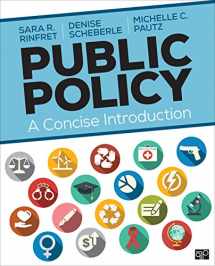
Public Policy: A Concise Introduction
ISBN-13:
9781506329710
ISBN-10:
1506329713
Edition:
1
Author:
Sara R. (Rose) Rinfret, Denise L. Scheberle, Michelle C. (Catherine) Pautz
Publication date:
2018
Publisher:
CQ Press
Format:
Paperback
352 pages
Category:
Public Affairs & Policy
,
Politics & Government
FREE US shipping
Rent
35 days
Due Jun 07, 2024
35 days
from $13.37
USD
Book details
ISBN-13:
9781506329710
ISBN-10:
1506329713
Edition:
1
Author:
Sara R. (Rose) Rinfret, Denise L. Scheberle, Michelle C. (Catherine) Pautz
Publication date:
2018
Publisher:
CQ Press
Format:
Paperback
352 pages
Category:
Public Affairs & Policy
,
Politics & Government
Summary
Public Policy: A Concise Introduction (ISBN-13: 9781506329710 and ISBN-10: 1506329713), written by authors
Sara R. (Rose) Rinfret, Denise L. Scheberle, Michelle C. (Catherine) Pautz, was published by CQ Press in 2018.
With an overall rating of 4.2 stars, it's a notable title among other
Public Affairs & Policy
(Politics & Government) books. You can easily purchase or rent Public Policy: A Concise Introduction (Paperback, New) from BooksRun,
along with many other new and used
Public Affairs & Policy
books
and textbooks.
And, if you're looking to sell your copy, our current buyback offer is $1.76.
Description
Public Policy: A Concise Introduction, by Sara R. Rinfret, Denise Scheberle, and Michelle C. Pautz, is a student-friendly primer that quickly connects readers to the inner workings of public policy. The text condenses early chapters on theory and the policy-making process, allowing students to take up key policy challenges―such as immigration, education, and health care―much earlier in the semester. Structured chapter layouts of substantive policy areas allow instructors to supplement with their own examples seamlessly. The book’s emphasis on policy choices asks students to look beyond simple pros and cons to examine the multifaceted dimensions of decision making and the complexities inherent in real-world problem solving. Not every student starts out engaged in public policy, so place your students―both majors and non-majors alike―in the driver’s seat by fostering their analytical skills early, and spend the rest of the semester discussing policy issues, examining data, and debating current policy examples that matter most to them.


We would LOVE it if you could help us and other readers by reviewing the book
Book review

Congratulations! We have received your book review.
{user}
{createdAt}
by {truncated_author}


